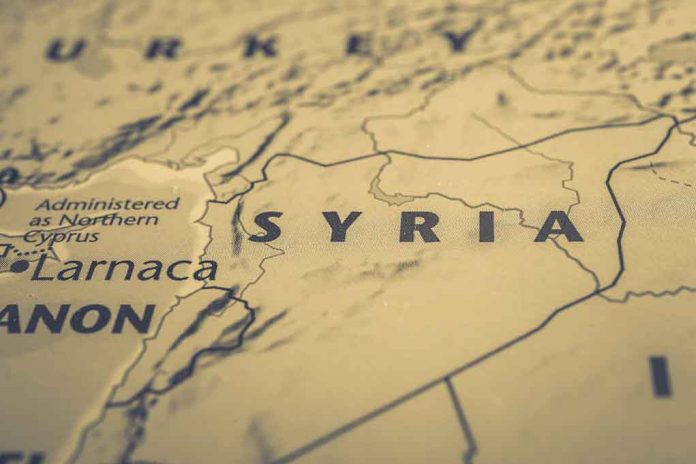
Senator Jim Risch demands Russian troops withdraw from Syria as the U.S. lifts all sanctions, marking a pivotal shift in Middle East strategy that could determine whether Iran fills the power vacuum left by Assad’s fall.
Key Takeaways
- President Trump has lifted all sanctions on Syria following the fall of the Assad regime, creating what Senators call a “fleeting opportunity” to safeguard American interests.
- Senator Risch emphasizes that removing Russian military presence from Syria is critical to prevent Iranian influence from expanding in the region.
- While Syria’s new interim government includes a U.S.-designated terrorist, Risch advocates for cautious engagement to keep the country from falling under Iranian, Russian, or Chinese control.
- The current U.S. sanctions strategy had been narrowly focused on chemical weapons and terrorist activities rather than addressing Russian military withdrawal.
- Risch warns that abandoning Middle East allies could embolden adversaries like China and potentially trigger a nuclear arms race.
Lifting Sanctions: A Strategic Shift in Syria Policy
In a significant policy change, President Trump has removed all sanctions on Syria, creating what senior lawmakers describe as a crucial window to reshape the future of the war-torn nation. Following the fall of Bashar Assad’s regime, Senators Jim Risch (R-Idaho) and Jeanne Shaheen (D-N.H.) have released a joint statement endorsing the decision as a timely response to the changing dynamics in Syria. The bipartisan support highlights the strategic importance of moving quickly to establish American influence before adversarial powers can fill the vacuum.
“We commend President Trump’s decision to lift all sanctions on Syria. His decision is a welcome response to our call for removal of barriers to expanded engagement with the Syrian interim government. As we have continuously stressed – including in our April 21 letter to Secretary Rubio – the fall of the Assad regime presents a fleeting opportunity for the United States to safeguard American interests,” said U.S. Senators Jim Risch and Jeanne Shaheen.
The removal of sanctions represents a significant departure from previous policy, which focused narrowly on punishing the Syrian government for chemical weapons use and support of terrorist organizations. The new approach aims to engage directly with Syria’s interim government while establishing conditions that protect American security interests and regional stability. Despite these positive developments, challenges remain as Russia continues to maintain military strongholds within Syria.
The Russian Military Presence: A Lingering Threat
During his address at the Hudson Institute, Senator Risch emphasized that a critical condition for continued U.S. engagement must be the complete withdrawal of Russian troops from Syria. While Russia has reduced its operational footprint following Assad’s removal, its military bases remain intact, providing Moscow with strategic leverage in the region. This continued presence poses a significant obstacle to stabilizing Syria and preventing Iranian expansion, which Risch identified as a paramount concern for U.S. foreign policy.
“To seize the moment, it will be important for the President’s decision to be swiftly implemented and for the Syrian government to move quickly to address U.S. national security concerns. This will help Syria remain on the path to freedom from the malign influence of Iran and Russia, from China’s attempt to gain an economic foothold in the Middle East, and from the resurgence of ISIS,” said U.S. Senators Jim Risch and Jeanne Shaheen.
The senator’s concerns reflect a broader strategic calculation that views the power vacuum in Syria as potentially dangerous if filled by adversarial powers. Intelligence reports suggest that Iranian-backed militias have already begun repositioning in eastern Syria, attempting to establish footholds in areas where Russian influence has diminished. This development underscores the urgency behind Risch’s call for swift action to secure American interests in the region.
Cautious Engagement with Syria’s New Leadership
Despite the fact that Syria’s new interim president has been designated as a terrorist by U.S. authorities, Senator Risch advocates for a pragmatic approach to engagement. The senator noted that the interim leader has severed ties with extremist factions and has expressed willingness to cooperate with American security objectives, particularly regarding the containment of ISIS. This nuanced position reflects the complex reality of Middle Eastern politics, where perfect allies are scarce and strategic compromises often necessary.
“I think the guy needs to be given a chance, particularly when he is saying what he’s saying, doing what he’s doing,” said Sen. Jim Risch.
The senator’s conditional support comes with clear expectations: Syria must demonstrate concrete steps toward expelling foreign influences, particularly from Iran and Russia, while also contributing to regional stability. Risch expressed particular concern about Turkey’s antagonism toward Kurdish forces in northern Syria, which complicates America’s ability to maintain reliable partnerships in the region. His position reflects a broader conservative approach that prioritizes stability and counterterrorism over ideological purity tests for potential allies.
The Broader Middle East Strategy
Risch’s advocacy for engagement in Syria fits within a larger strategic vision that opposes American withdrawal from the Middle East. During his Hudson Institute address, the senator emphasized that abandoning allies in the region would not only undermine U.S. credibility but could potentially trigger a dangerous cascade of nuclear proliferation. With Iran continuing to pursue nuclear capabilities, Risch warned that American disengagement could force Israel to take unilateral action, potentially igniting a wider regional conflict.
“We have relationships around the world that are just as important to us for our national security as [are] our military operations. We need friends,” said Sen. Jim Risch.
The senator’s warnings carry particular weight given his direct conversations with Israeli leadership. Citing personal discussions with Prime Minister Netanyahu, Risch conveyed Israel’s absolute determination to prevent Iran from acquiring nuclear weapons. This determination, coupled with expanding Iranian influence through proxies like Hamas, Hezbollah, and the Houthis, creates a volatile situation that requires active American engagement. By taking a firm stance on Russian withdrawal from Syria, Risch aims to neutralize one vector of Iranian expansion while preserving America’s strategic position in this critical region.









